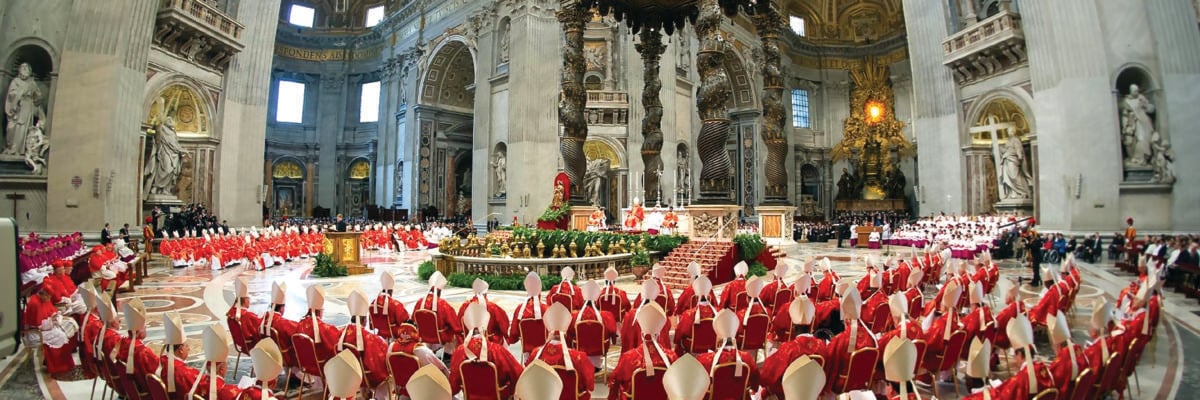
Cy Kellett welcomes apologist Joe Heschmeyer to discuss the concerns of a former Baptist pastor who is contemplating joining the Catholic Church.
Transcript:
Caller: I think one of my big ones that I have regarding why I’m not Catholic, whenever I speak to Catholics, they’ll typically bring up the Magisterium and how the Magisterium is the, I guess the way to say it is like the governing authority for the interpretation of Scripture and doctrine.
Joe: That’s not a half bad definition.
Caller: Part of my prop. Okay, that’s not a bad definition.
Joe: Yeah, not a bad definition. It comes from the word for teacher, magister. So it just means the teaching authority of the Church.
Caller: So, yeah, okay, great. So then the next step for me then is I go, well, I don’t have access to that. Like, I don’t. I can’t just go to the Internet and type in what does the Magisterium teach on X verse or something like that. It’s. I’m always, I’m always kind of thrown for a loop on that because it feels very much like an appeal to some ghostly authority I’m not allowed to directly ask a question to.
Joe: Okay, yeah, I see what you’re saying. I think so. The teaching office of the Church is described in the Catechism beginning in paragraph 888. Now, the first thing I’d say is the Catechism itself is a great summary of what the Church teaches on various topics.
The second thing that’s probably worth pointing out is there’s a difference frequently in how Catholics and Protestants particularly will approach these kind of questions. Where most teaching from the Catholic side is done at the level of doctrine, not at the level of the chapter or verse.
So this often throws people coming from a Protestant background for a loop because they’re expecting that there’s somewhere like an official Vatican kind of commentary, verse by verse, on Scripture. And that’s not the way the Magisterium tends to teach.
There are a handful of verses where in the course of defending a particular doctrine, the Church will say, for instance, with original sin, that when St. Paul talks about sin entering the world through one man, that this is in reference to original sin. But those are actually pretty few and far between.
The usual way that this is approached is ex doctrina, like the Trinity is defined, but it’s not. You have to read this particular Bible verse as supporting the Trinity. It is rather that taking the whole of Scripture, if your conclusion on the topic of the nature of God leads you to a non-Trinitarian conclusion, then you’ve read Scripture wrong. Whatever passage you’re reading that has led you in that direction, you’re misreading it. But it’s not verse by verse.
Think about the Nicene Creed, for instance. The Nicene Creed is doctrine by doctrine. It’s not verse by verse.
So then it’s like, okay, well, if I want to find out what does the Church teach on a particular topic, you actually could Google what does the Magisterium teach about X topic? And you’d probably find a pretty good summary. You might find it on our website, you might find it on the Vatican’s website. You might find any number of people talking about it, and then you look at what they’re quoting.
When you’re looking for magisterial teaching, you look to things that ecumenical councils have said, particularly in defining dogma. You’re looking at things that popes have said, particularly in defining some doctrine, some dogma, as a matter of faith and morals. And you’re looking for the clear witness of what the bishops in union with the Pope have said.
And if you have the Church Fathers and look at how 2000 years of Christians have spoken on it, and that can make at times, admittedly for a very deep dive. So I’m giving you this sort of deep dive answer. A much easier way in 90% of cases is just look up what the Catechism has to say.
And thanks be to God, there’s a lovely church down in Lafayette, Louisiana, the St. Charles Borromeo. Oh, sorry, it’s Picayune, Mississippi. My mistake. Picayune St. Charles Borromeo has a searchable Catechism of the Catholic Church. So you can literally just go to their website and put in whatever word and it’ll take you to the corresponding paragraph of the Catechism, which is a great way to get a short here’s what the Church teaches on XYZ topic.
Another good resource, if you want to stick around after we get done talking, is Trent Horn’s *Why We’re Catholic*, where it’s a good kind of primer on just like the kind of some of the big ticket items. And then that can give us sort of a basis to move forward from there. How does that sound?
Joe: Okay.
Joe: I think that that’s helpful, I guess then a follow up to that. Yeah, because I think that was a good distinction between it’s not so much about chapter and verse as it is the topics. Would you say that the Magisterium then all of the topics that it’s exhaustive or that there’s just topics it doesn’t speak on?
Joe: That’s the second one. There are topics it doesn’t speak on. There are topics that are still ar that we’re in the process of sort of looking at. So, for instance, bioethics. There’s all sorts of issues like for instance, embryo adoption where some couple practices IVF and then they convert and they realize they can’t just throw away their children. But maybe they’re not in a stage where they’re old enough or they’re young enough to carry these children to birth.
And then this raises this moral question of, well, maybe we’ve got friends or relatives who would be happy to bear these children, but that looks like having a donor. And all of those kind of moral questions, these are very new questions that weren’t even an issue at the start of my lifetime.
And so we’re never going to just exhaust here’s everything to know about God, or here’s everything to know about morality, or here’s every possible question people could ask. But the focus isn’t let’s make sure we have a common starting place and then all go interpret Scripture for ourselves. The focus is much more let’s make sure we’re arriving at the right destination on these issues of faith and morality.
Cy: I’ll tell you what, Joseph, what I’d like to do is send you a copy of *Why We’re Catholic*. But I’d also like to add a second book for you. It’s called *Teaching with Authority*.
Joe: Oh, that’s a great choice. Yeah, that’s direct on point.
Cy: How to cut through doctrinal confusion and understand what the Church really says. That’s by Jimmy Akin. So two books for you, Joseph.



